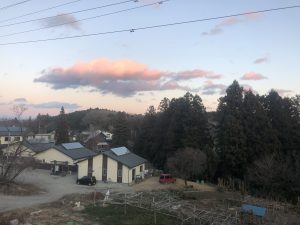Over the past few weeks in Japan, I have grappled with the important concept of the tendency to view cosmopolitan ideals as the ultimate state that everyone should strive toward, and the tension that this idea has with organic farming and life at ARI. Technology also plays into this idea particularly when looking at and thinking about life in urban versus rural Japan. I started thinking about this during the last time we were at ARI, and what we have read in Simon Avenell’s Transnational Japan and the Global Environment Movementhas given me a meaningful way to voice this idea. In explaining his focus on the local in a global context, Avenell says, “this is not a history in which ‘parochial’ or ‘narrow’ local sentiments and perspectives finally matured into a ‘superior’ cosmopolitan mentality” (Avenell, 7). This statement carries immense weight in its defense of local ideas as holding validity in their own right, and not having to conform to more “civilized” or cosmopolitan ideas in order to be considered advanced or current.

It is also interesting to think about this issue in the context of the incredible technological influence Japan has had on the rest of the world. In the major metropolitan areas, such as Tokyo, the presence of technology is inescapable. People generally strive for the most current technology, and anything that is more than a couple product generations old is considered ancient. In rural farming areas, chemical fertilizers and pesticides might be considered technology in a similar sense as the technology in metropolitan areas. At ARI, these farming technologies are shunned because they do not align with the organic practices that are followed here. There is a major focus on local solutions using what resources are available, so ARI has developed their own fertilizer that utilizes manure from the animals on the farm and microorganisms from the soil. In this way, they are able to reuse their waste and avoid purchasing chemical fertilizers from outside companies. This is just one example of ways in which ARI places emphasis on the value of the local over solutions that might be considered more advanced from a cosmopolitan lens.

This concept of recognizing local practices as equally as valid as cosmopolitan practices holds particular value in Japan due to the current population trends; the country’s overall population is decreasing, and there is a significant trend of people moving into the cities from rural areas. This trend is leaving many rural areas depopulated and facing problems in regard to food production and maintaining the canals and other community organized farming practices that are so crucial to farming culture in Japan. As Avenell discusses, Japan is at a crucial moment in regard to protecting rural cultures and practices, and it is important that the local is preserved as an equally valid form of progressive technology in comparison to cosmopolitan technology.


Recent Comments